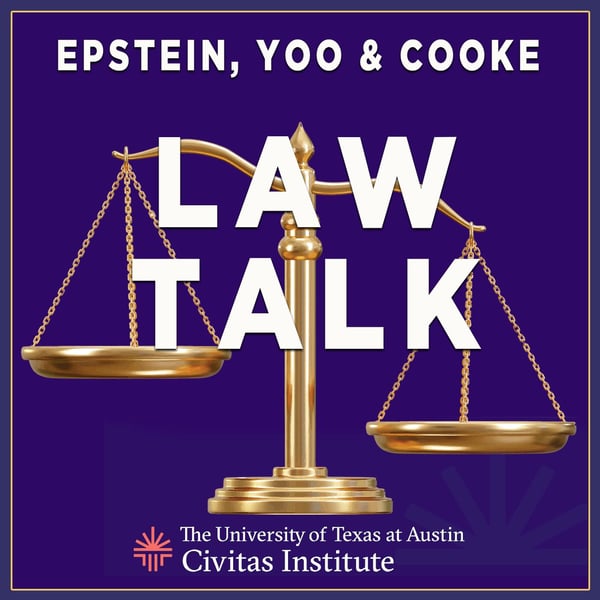Less Sex, More Text: Law Talk's 2025 Supreme Court Recap
Law Talk With Epstein, Yoo & Senik
The Civitas Institute at the University of Texas at Austin
4.9 • 677 Ratings
🗓️ 8 July 2025
⏱️ 71 minutes
🧾️ Download transcript
Summary
Transcript
Click on a timestamp to play from that location
| 0:00.0 | Okay. |
| 0:08.5 | Welcome to Law Talk. |
| 0:11.1 | Now a production of the Civitas Institute at the University of Texas, Austin. |
| 0:18.5 | Welcome to, well, do they need any introduction? They do not, Richard Epstein and |
| 0:24.3 | John U. I am Charles C.W. Cook. And since we last did an episode, we had a whole host of huge |
| 0:32.7 | Supreme Court cases. In fact, we had six in one day on the last day of the term. That was Friday, |
| 0:39.9 | June 27th. The biggest case of the term, arguably, the one we're going to start with today, |
| 0:49.2 | was Trump v. Kasa, capitalized, C-A-S-A. Now, this started life as a case about the 14th Amendment and birthright citizenship. |
| 1:02.7 | But over time, it morphed away from that. |
| 1:06.1 | And in fact, the merits were not reached and became a case about the validity of nationwide |
| 1:13.6 | injunctions. |
| 1:15.5 | It was six to three and the usual suspects lined up in the usual positions. |
| 1:24.4 | Now, before we go to John and to Richard, I will tell you my big takeaway from this, |
| 1:31.0 | which was that I was persuaded by the majority opinions that, legally speaking, that is under the |
| 1:42.1 | Judiciary Act, under the various statutes that have been passed since, |
| 1:48.1 | in particular the Administrative Procedure Act, and under the court's inherent powers constitutionally, |
| 1:55.5 | there is a limit on nationwide injunctions and that it is not acceptable for a random judge somewhere in the |
| 2:06.3 | country to claim powers that he does not, per the court, have. But here's my worry. I worry that without Congress acting to take back power from the president, without the |
| 2:23.5 | Supreme Court getting involved in big cases swiftly, and without Congress giving the lower |
| 2:31.6 | court some more guidance on when they ought to intervene, that this is going |
| 2:38.9 | to empower the presidency and make it even more imperial. |
| 2:44.4 | And as such, although I think that the dissents, which were sometimes quite silly, were wrong on the law and that the court was obliged only to |
... |
Please login to see the full transcript.
Disclaimer: The podcast and artwork embedded on this page are from The Civitas Institute at the University of Texas at Austin, and are the property of its owner and not affiliated with or endorsed by Tapesearch.
Generated transcripts are the property of The Civitas Institute at the University of Texas at Austin and are distributed freely under the Fair Use doctrine. Transcripts generated by Tapesearch are not guaranteed to be accurate.
Copyright © Tapesearch 2025.

